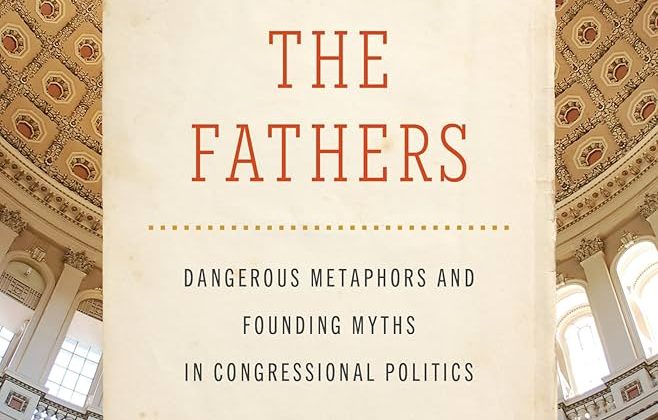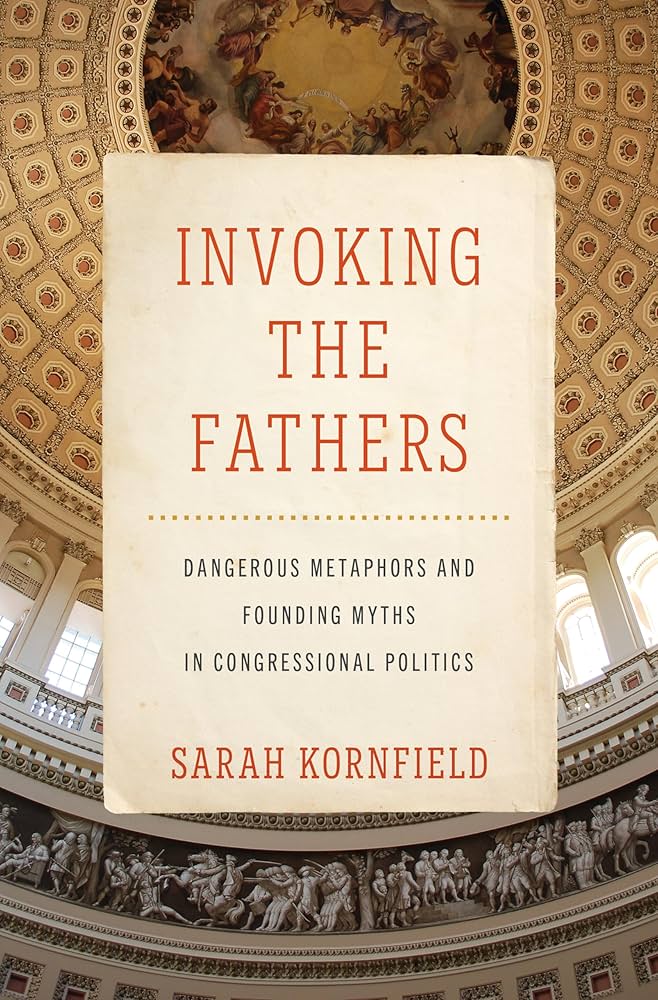

Sarah Kornfield is Associate Professor of Communication and Affiliated Professor of Women’s and Gender Studies at Hope College. This interview is based on her new book, Invoking the Fathers: Dangerous Metaphors and Founding Myths in Congressional Politics (Johns Hopkins University Press, 2024).
JF: What led you to write Invoking the Fathers?
SK: In 2017, during a speech about tax cuts, President Donald Trump mentioned that his daughter Ivanka calls him “Daddy” and the crowd went wild. At that moment, I heard a mix of fatherhood, power, and politics. Then, during the stay-at-home orders during the early stages of the Covid-19 pandemic, an extended family member sent around a meme on social media that attributed the quote, “I prefer dangerous freedom over peaceful slavery” to Thomas Jefferson. I was struck by the way this appeal drew upon the authority of Jefferson–a father who enslaved his own children–to protest the pandemic precautions. These two moments were the catalysts for my book. They spoke to each other in my mind: Trump’s appeal to fatherhood and the perennial popularity of the “Founding Fathers” are connected–and this book traces those connections.
When I began working on the book in earnest, I steered the project away from presidential rhetoric, because this trend of appealing to the “Founding Fathers” is bigger than the presidency. The phrase itself, “Founding Fathers,” was coined in 1916 by Warren G. Harding during his presidential campaign–which he won in a landslide. Today, the phrase is used practically everywhere, and I chose to study its use in congressional speeches–focusing on when, how, and to what effect congresspeople invoke the “Founding Fathers” in the House and Senate chambers.
JF: In 2 sentences, what is the argument of Invoking the Fathers?
SK: Contemporary politicians invoke the memory of the founding era and use the metaphor of “Founding Fathers” when (1) advocating for rights and liberties, (2) demanding checks and balances, (3) celebrating American exceptionalism, and (4) calling for bipartisan politics. These four situations are all disputes over what kind of nation America is or should be … and the metaphor of “Founding Fathers” rigs the game, creating and reinforcing a legislative system in which some are more equal than others.
JF: Why do we need to read Invoking the Fathers?
SK: Because this book demonstrates how the “Founding Fathers” are used and abused. It details how counterfactuals, nostalgia, American exceptionalism, and selective amnesia about the nation’s founding reinforce white Christian nationalism and patriarchy—and how people of color speak back and resist these interpretations.
JF: Why and when did you become an American historian?
SK: I came late! I wasn’t interested in history as a child and I didn’t study it in college beyond the gen ed requirements. Instead, I began studying American history through the research questions I was asking. For instance, I had a project about the portrayal and understanding of pregnancy in contemporary U.S. news coverage. The deeper I got into the project, the more I needed to learn about how the Pregnancy Discrimination Act of 1978 was passed and what it did (and didn’t) change for U.S. women. Similarly, I had a project analyzing Amanda Gorman’s inaugural poem, “The Hill We Climb,” and the deeper I got into that project, the more I needed to learn about the history of African American rhetoric. Essentially, I’m asking questions about contemporary politics, but finding that the answers are rooted in U.S. history.
This remains true of my work in Invoking the Fathers. To understand what is happening when contemporary politicians use appeals to the “Founding Fathers” as they persuade–or attempt to persuade–their audiences, we have to trace backward in order to understand how politicians use and abuse the memory of the founding era, the Declaration of Independence, the Constitution, the Bill of Rights, and the other constitutional amendments.
JF: What is your next project?
SK: I’m currently working on a project titled, Feminism and Feminist Movements in America: An Encyclopedia of Ideals and Activism for Bloomsbury Press. As the editor for this project, I’m essentially creating a compendium of everything a high school or college student needs to know about feminism and American history–including theory, activism, and key figures and moments within feminism’s history. The work is challenging but also deeply rewarding.
JF: Thanks, Sarah!